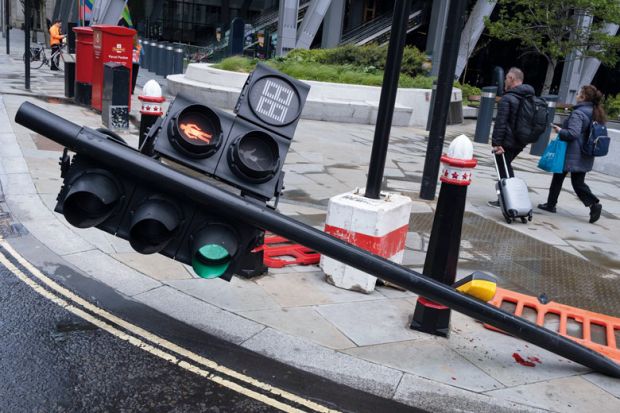UK universities are “doing what they can” to reduce the impact of marking delays on international students but some have become trapped in the crossfire of the industrial dispute, despite an unusual display of flexibility from the Home Office.
Under intense lobbying from the sector, new guidance was released earlier this month that said UK Visas and Immigration (UKVI) will “exercise discretion” and hold the applications of those wishing to apply for graduate visas for eight weeks if they are still awaiting results.
Students are also being offered the chance to extend their study visas without having to meet academic progression requirements so they can remain in the country until the situation is resolved.
But such extensions come at a cost of £490 each – which UKVI is not waiving – and students said they feared missing out on jobs and other opportunities despite the concessions.
The issue has prompted the University and College Union (UCU) to write to home secretary Suella Braverman, raising concerns that students at Edinburgh and Durham universities – as well as other institutions – are facing visa problems.
Campus resource: In support of international students' journey through UK higher education
Will Scheffler, 21, originally from Wisconsin, US, is one of the students at Edinburgh affected. A fourth-year international relations student, he was hoping to transfer to the London School of Economics to study a master’s in September but has not been given a degree classification by Edinburgh because of the boycott.
With no timeline for when marks will finally be awarded, Mr Scheffler said he had been advised by the university to return to his home country and apply for a new student visa if and when his place at LSE is confirmed.
He said this contradicted what he had been told previously and he felt as if he was in a “weird limbo situation” and was receiving “confusing, conflicting information”.
It was unclear if Mr Scheffler would be able to stay in the UK – where he has a job and a flat – over the summer as planned but “going back to the States for upwards of a month to wait for UKVI to process my application would not be ideal, on top of the cost of a roundtrip flight to and from America”.
The contrasting ways that universities have dealt with cases was adding to the confusion. Some institutions with large numbers of students affected have been forced to issue blanket advice but others have been able to work with students on a case-by-case basis, leading to mixed results.
Some students have been issued with “completion of study” letters which outline the marks received so far but are not accepted by UKVI for progression on to the graduate route. A “highly likely to complete” letter is accepted but some universities have been reluctant to issue these – particularly for students with a large amount of work still ungraded – due to fears about academic integrity.
Sanam Arora, the chair of the National Indian Students and Alumni Union, called on more universities to offer to cover the cost of visa extensions for their students but said generally institutions were doing what they could to help despite having limited options while the dispute continued.
She said many international students already felt it was difficult for them to compete for jobs if they were planning to stay for the time-limited graduate route and the uncertainty of the boycott was “making it even harder to go after the scarce opportunities that exist”.
Register to continue
Why register?
- Registration is free and only takes a moment
- Once registered, you can read 3 articles a month
- Sign up for our newsletter
Subscribe
Or subscribe for unlimited access to:
- Unlimited access to news, views, insights & reviews
- Digital editions
- Digital access to THE’s university and college rankings analysis
Already registered or a current subscriber? Login








